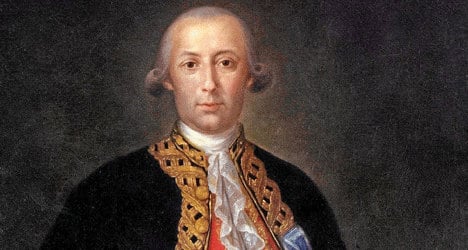The United States Congress and Senate approved the motion recently and on Tuesday December 9th a painting of Gálvez, who gave his name to the Texan city of Galveston, was hung in the Capitol in recognition of his labour.
The legislative text which sought to bestow Gálvez this posthumous honour was sponsored by two Republican Congressmen, Representative Jeff Miller (Florida) and Senator Marco Rubio (Florida), who said that Gálvez "was a hero of the American War of Independence for risking his life for the freedom of the American people".
The Spanish military hero "played an integral role in the American War of Independence and helped secure the independence of the United States of America", according to the text, cited by Spanish news site Libertad Digital.
The military leader, who served as Colonial governor of Louisiana and later Viceroy of New Spain (which included parts of Florida) aided the American Thirteen Colonies and led Spanish forces against Britain, defeating Britain in the Siege of Pensacola (1781) in which he also reclaimed Florida for Spain.
Spanish Ambassador to the United States, Ramón Gil-Casares, told reporters that granting a Spanish military figure such an honourary title was "absolutely exceptional" because there has only ever been "six previous cases" in the United States.
"This country would have gained its independence 20 years later if it had not been for Bernardo de Gálvez", said the Spanish Ambassador, who praised that “Spain’s contribution to the American War of Independence was being acknowledged”.
The legislation only lacks one thing: the signature of President Barack Obama, who will see no reason to say no, according to Ambassaor Gil-Casares.
To highlight the important role of this Spanish figure in North American history, the Spanish Embassy is planning to organize, among other initiatives "a huge exhibition" and in 2016 a conference on "the Spanish presence in the independence of the United States with Bernardo de Gálvez at the head".
After learning of the honour to be bestowed on Gálvez, the Hispanic Council, a think tank with offices in Washington D.C. and Madrid stressed that the honourary title was "the highest recognition that a foreigner can receive".
The tribute is "an excellent example of the opportunity for Spain to take advantage of shared history with the United States to strengthen relations between the two countries," said the director of the Hispanic Council, Daniel Ureña, in a statement.
According to Ureña, that opportunity will be particularly significant in 2015, when "the 450th anniversary of the founding of St. Augustine, Florida, will be held". The city, founded by Spain in 1565, is the US’s oldest continuously populated, European-established city.



 Please whitelist us to continue reading.
Please whitelist us to continue reading.
Member comments